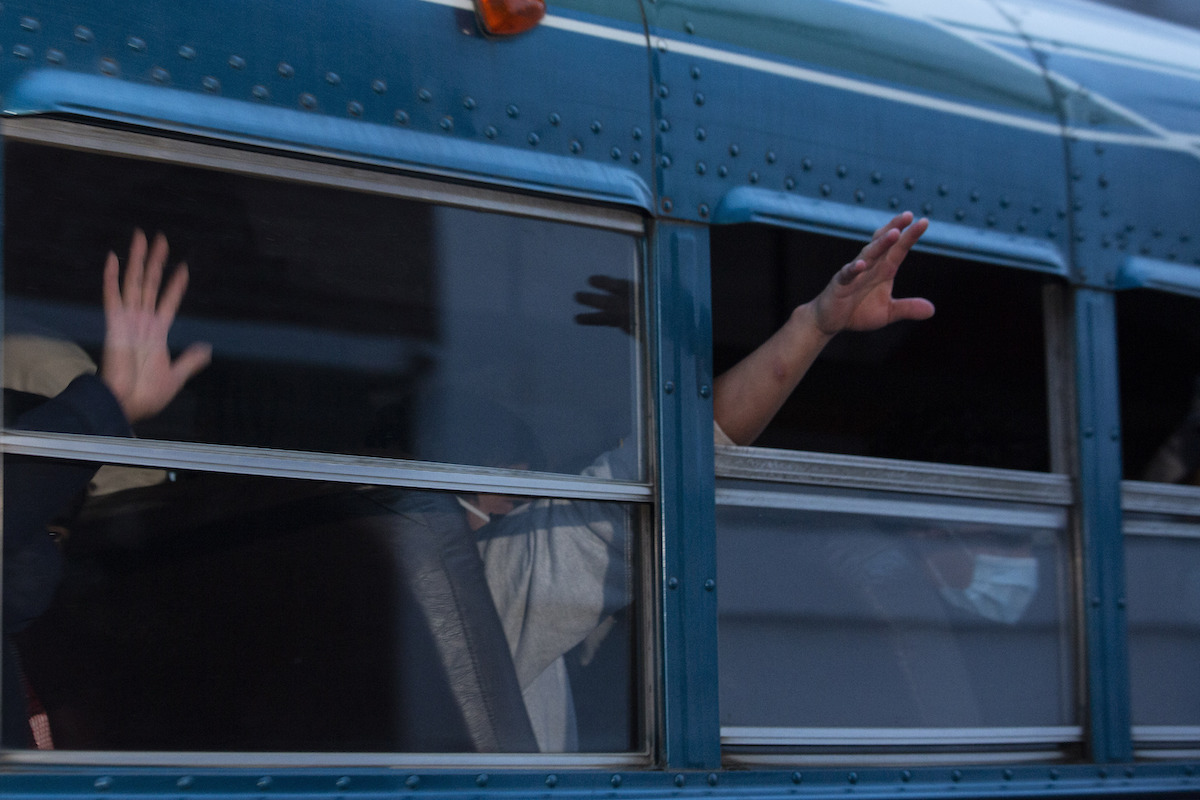

In this May 4, 2020, file photo, Guatemalans deported from the United States, wave from a bus after arriving at La Aurora airport in Guatemala City. (AP Photo/Moisés Castillo, File)
By NOMAAN MERCHANT, Associated Press
HOUSTON (AP) — A federal judge has temporarily stopped President Donald Trump’s administration from expelling a teenager to Honduras under a policy enacted during the coronavirus pandemic that didn’t give the teen the chance under federal law to stay in the United States.
According to the American Civil Liberties Union, the 16-year-old had been scheduled to be expelled Wednesday, six days after he entered the U.S. to reunite with his father. The ACLU says the boy fled because gang members threatened him after he saw one of them kill someone in his neighborhood.
U.S. District Judge Emmet Sullivan late Tuesday issued an order preventing the government from expelling the teenager, who was not identified by name in court papers, through the end of the day Wednesday as litigation is pending.
The case is the first known challenge of the Trump administration’s expulsion of hundreds of immigrant children at the border under an emergency declaration citing the coronavirus. Trump’s administration says that under federal law on public health emergencies it must close the border to asylum seekers —including children— to prevent the spread of the virus.
Under federal law, border agents would typically take the teen and other youth from outside Canada and Mexico to the U.S. Department of Health and Human Services, which places unaccompanied migrant children with sponsors, usually family members. Instead, according to the ACLU, agents have detained the 16-year-old in a detention center, then a hotel, without giving him the chance to request asylum. The boy is in good health and has shown no signs of COVID-19, according to the group.
Opponents of Trump’s clampdown on immigration say the coronavirus is a pretext to accomplish a long-held goal of his administration: shutting down asylum at the southern border.
“This is more extreme than any other border policy we’ve seen from the administration,” said Lee Gelernt, an ACLU lawyer. Gelernt argued the ACLU’s lawsuit challenging thousands of family separations that led to a federal judge’s June 2018 order mandating that parents and children be reunited.
Under a 2008 anti-trafficking law and a federal court settlement known as the Flores agreement, children from countries other than Canada and Mexico must have access to legal counsel and cannot be immediately deported. They are also supposed to be released to family in the U.S. or otherwise held in the least restrictive setting possible. The rules are intended to prevent children from being mistreated or falling into the hands of criminals.
Health and Human Services provides services for immigrant children who are first apprehended by border agents. Since the U.S. Centers for Disease Control and Prevention issued its March 20 order restricting immigration, the process of referring children to HHS has been almost entirely shut down.
Thousands of children are typically apprehended by the Border Patrol monthly crossing from Mexico, according to the agency’s statistics. In April, the Border Patrol processed 166 children as “unaccompanied” minors, meaning they would be taken to HHS youth holding facilities and allowed to stay in the U.S. at least temporarily, and expelled the remaining 600.
HHS is currently receiving about one child a day, spokesman Mark Weber said.


